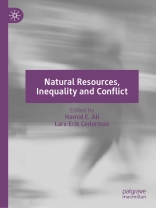This edited volume explores the link between natural resources and civil conflict, focusing especially on protest and violence in the context of mining and the extraction of minerals. The primary goal of the book is to analyze how the conflict-inducing effect of natural resources is mediated by inequality and grievances. Given the topicality of the current boom in mining, the main empirical focus is on non-fuel minerals. The work contains large-N studies of fuel and non-fuel resources and their effect on conflict. It presents case studies focusing on Zambia, India, Guatemala, and Burkina Faso, which investigate the mechanisms between the extraction of natural resources and violent conflict. Finally, the book provides a summary of the previous analyses.
Inhoudsopgave
1. Introduction.- 2. Mineral Resources and Conflict: An Analytical Overview.- 3. No Extraction without Representation: The Ethno-Regional Oil Curse and Secessionist Conflict.- 4. Digging Deeper: On the Role of Grievances in African Mining Conflicts.- 5. Ethnic Mobilization and Collective Grievances in the Cooper Mining Areas of Zambia.- 6. Resource Extraction and Conflict in India.- 7. Indigenous Mobilization and Resource Extraction in Guatemala.- 8. Fueling Conflicts by Sharing Benefits? Qualitative Evidence from a Mining Conflict in Burkina Faso.- 9. Conclusions for Theory and Policy.
Over de auteur
Hamid E. Ali is Associate Professor of Economics and Public Policy, Doha Institute for Graduate Studies, Qatar.
Lars-Erik Cederman is Professor of International Conflict Research at ETH Zürich, Switzerland.












